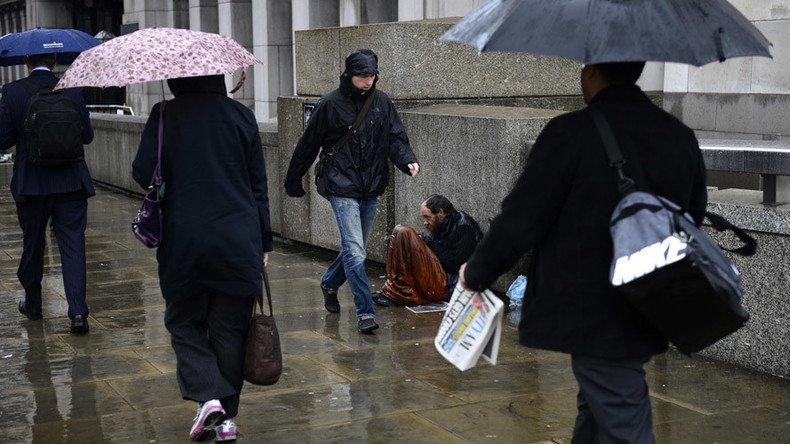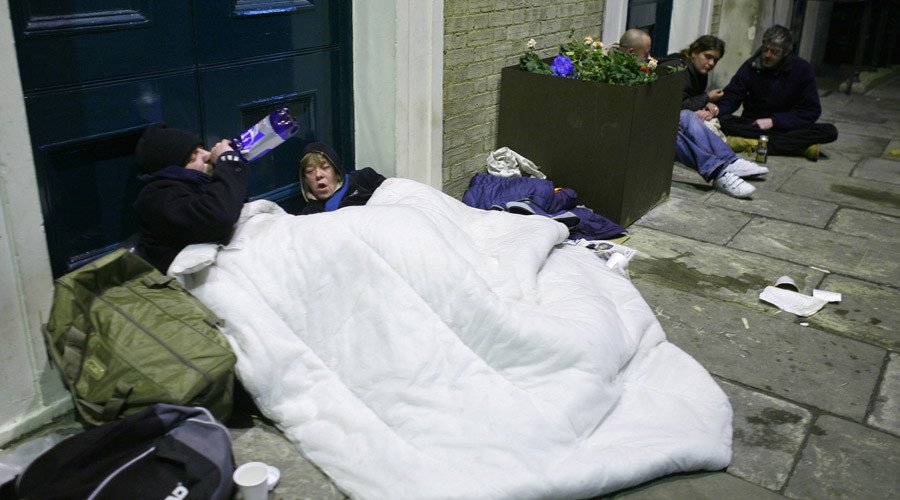Who are the real culprits behind UK's collapsing public services? (Hint: not migrants)

Anyone following David Cameron's negotiations with the EU, or the subsequent 'in-out' referendum debate in Britain, would perhaps forgiven for believing that migration is the cause of all Britain's woes.
Cameron himself has been cultivating the link in voters' minds between migration and public service decline since at least 2013, when he made clear his desire to prevent migrants from accessing public services, including even the NHS.
But what began as just another piece of rightly-riduculed Tory vindictiveness has now reached a crescendo. Cameron's recent push for an 'emergency brake' on migrants' benefits has served to deepen the false impression that it is migration that is putting public services under strain, a point which Theresa May has now been making explicitly.
"Immigration at this level", she said, referring to recent figures putting net migration at 323,000 over the past year, "puts pressure on public services, on housing, on infrastructure - it can hold down wages and push British workers out of jobs".
Govt austerity cuts cause 51% rise in Scottish children going to school hungry https://t.co/2cshlddhBRpic.twitter.com/r2iZD56rNX
— RT UK (@RTUKnews) December 30, 2015
Public services are indeed coming under pressure, as made clear by recent reports that the NHS faces collapse or comments by leading children's charity Barnado's that the government is ‘no longer providing an adequate safety net’ for the poorest families, with ‘devastating effects’ for vulnerable youngsters. The wages of many are stagnating as well, with local government workers seeing their wages fall by 20 percent between 2010 and 2013, and a quarter of those working in social care in Britain now thought to be effectively working for below the minimum wage. The poorest 10 percent of the population, according to the Guardian, have seen their wages effectively slashed by 30 percent.
But are immigrants behind all this?
What the government would dearly love us to forget all about is what happened to the British economy and public finances in 2008 - and why.
At the beginning of 2008, the UK's public debt (that is, money owed by the government to its creditors) stood at 43 percent of GDP. By the end of the year, that debt had increased to 153 percent of GDP - it had more than tripled, that is, in the space of just one year.
This massive jump was due to one reason alone. That reason was not 'profligate spending' on public services, nor was it shelling out on migrant benefits (for example, on that 0.5 percent of recent EU migrants who claim job seekers allowance). It was due solely to the 'banker's bailout'. The government poured 133 billion pounds into banks such as RBS and Lloyds to prevent their bankruptcy, and guaranteed dodgy assets and loans by these and other banks to the tune of well over one trillion pounds, leaving the public purse on the hook for the risky investments made by over-confident city boys on six and seven figure salaries.
The money to fund that bailout was borrowed on private markets, charging an average of 4.2 percent interest per year. We have been paying that interest ever since; indeed interest payments on Britain's debt - 2/3 of which, we must never forget, was incurred by bailing out the banks - last year reached £1billion per week, for the first time in history. That amounts to just under £1000 per year for every man, woman and child in the country, just on interest payments on a debt which was mostly the result of the bankers' bailout.

However, it is not only the bailout itself which has led to Britain's growing debt, but the overall impact of the financial crisis as well. The 2007-2008 banking crisis - caused by the souring of bad loans made by private banks - led directly to a recession from which the world has yet to recover. This recession, like all recessions, had the effect of lowering tax receipts for the government, and increasing the numbers forced to seek unemployment benefit.
Professor Desmond, former treasury adviser and dean of Social Sciences at Sussex University, conducted a study into the wider economic impact of the banking crisis, concluding that "I have estimated taking into account the losses of output that would have occurred since 2008 without the financial crisis caused by the reckless lending of the banks, and projecting the losses forward until the end of 2012, that the total cost to the economy - all of us - is around 11 to 13% of GDP", a truly massive sum equating to over one quarter of the country's public spending bill.
The banking sector itself, meanwhile, has been doing fine. While RBS - which received £45 billion of public money in 2008 - has been recording losses every year ever since (most recently £1.9 billion, it was announced this week), it has still found fit to prioritize paying massive bonuses to its staff way above paying back the government.
In 2010, RBS paid over £1 billion in bonuses to staff and in 2013, after yet another year of losses, it announced that 93 of its staff would be recieving over £1 million each. This is a straightforward looting of the public purse.
Bankers have also managed to massively reduce their tax bill since 2008, further adding to pressure on public finances and straining public services. Research by the London School of Economics last year found that "Corporation Tax receipts from the banks in current prices have declined from £7.0 billion in 2005-6 to just £1.3 billion in 2011-12, £2.3 billion in 2012-13 and £1.6 billion in 2013-14."
However, they noted, "surprisingly, the fall is not because of a collapse in these banks’ global operating profits, which were actually marginally higher in the three years 2010-12, after the bailout, than in 2005-7, in the boom before the crisis." Rather, the study claimed, "During the period of our study, the government has exempted some components of overseas income from UK taxation. This has created new opportunities for tax avoidance."
Having pumped money into the hands of the banking class in its time of need, the government is apparently determined not to get it back during times of profit.
Another rarely-mentioned component of Britain's crisis in public finances is the PFI scandal. PFI - the Private Finance Initiative - has been used by both Labour and Tory governments as a means of keeping government spending 'off the books' by encouraging private companies to build and operate infrastructure such as hospitals and schools, with the government paying them for the use of these services. This saves the government having to pay the upfront costs of building such projects but means they end up paying far more in the long term having to 'rent' them back from the private companies.
In 2011, the Centre for Policy Studies wrote a report suggesting that whilst official public debt stood at £2.252 trillion, this figure did not include "projects financed through PFI, unfunded public sector pension liabilities, nor contingent liabilities such as Network Rail." Including these 'hidden' liabilities, they calculated, brought the total public debt up to £3.65 trillion.
And PFI - by forcing public bodies to pay through the nose for using 'private' schools and hospitals - is directly leading to the bankruptcy of hospitals. A 2014 inquiry by the Public Accounts Committee found that those NHS providers most reliant on PFI have the worst financial results, and four of the six most indebted NHS trusts (with debts of over £25 each) had PFI schemes (compared to less than a third of all providers).
Britain's budget deficit has been growing, then, mainly due to the interest payments on debts incurred by the bankers bailout, the overall impact of the recession caused by the reckless lending of the banks, and the massive payouts to the private sector resulting from PFI.
Meanwhile the country’s wealthiest private companies and individuals have been doing very well, despite the recession (or perhaps even because of it, as their smaller competitors are driven out of business). Already by the financial year 2010-2011, the country's 1000 richest individuals had increased their wealth by over £60 billion, according the Sunday Times Rich List, and a similar story has been told every year since then, to the point where the richest 1 percent of the British population now own more than half the wealth.
The real story of pressure on Britain's public services, then, is of the British government facilitating the looting of public funds by bankers and PFI investors, whilst demanding that the costs be paid by massive public spending cuts in the form of 'austerity'.
In John Lanchester's excellent 'Whoops!', a layman's guide to the financial crisis, he writes that the debt incurred by the bankers bailout "is going to cost from £35 to £47 billion per year to service....we'll be spending more on debt than we are on the entire transport budget. All this means tax rises, a near-total freeze on government spending, swingeing public sector job cuts, companies laying off every worker they can to save costs....As the bill is paid, and especially as taxes go up while services and jobs go away, people are going to get steadily and inexorably more furious. I'm not sure at whom: I hope it's at the responsible bodies, but I wouldn't bet on it. Public rage is like lightning, and tends to discharge its energies at anyone who has the bad luck to be in the wrong place at the wrong time".
This is precisely what is happening with migrants. They are being scapegoated for a collapse in public services that is the inevitable consequence of the government's policy of transferring wealth from public sector to the private, a collapse which would still be occurring even if not a single foreigner had set foot on British soil in the last twenty years (indeed, it would likely be far worse, given their role in actually providing Britain’s public services, as low paid workers). Where Lanchester is wrong, however, is that this is simply bad luck.
Knowing their own culpability, the British government are willfully and cynically directing anger away from themselves and the billionaire class they represent, and towards some of the most vulnerable in society. It is the oldest trick in the book.
The statements, views and opinions expressed in this column are solely those of the author and do not necessarily represent those of RT.













